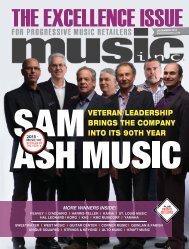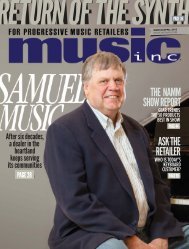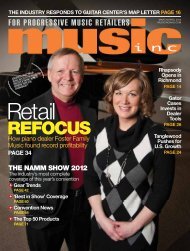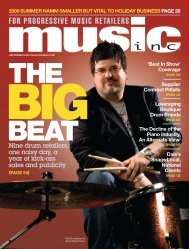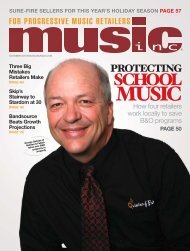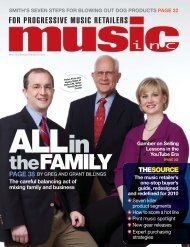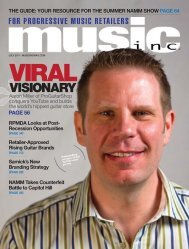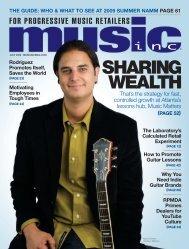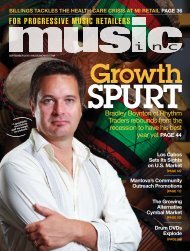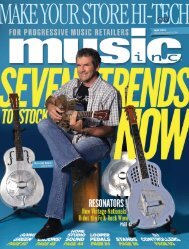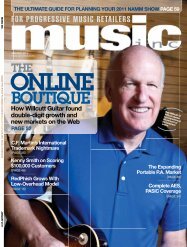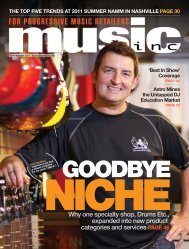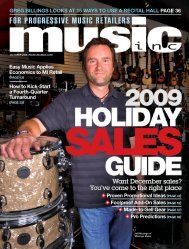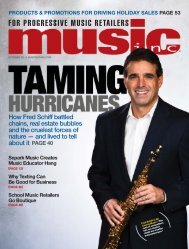Create successful ePaper yourself
Turn your PDF publications into a flip-book with our unique Google optimized e-Paper software.
It’s not what you say<br />
that matters — it’s what<br />
people hear. Here’s<br />
how to reach them<br />
28 I MUSIC INC. I JULY 2012<br />
THE CUSTOMER WHISPERER I BY GREG BILLINGS<br />
Be Understood<br />
I’ve spent the last 35 years arguing with customers when I really<br />
should have been telling them what they wanted to hear.<br />
Yes, a beginning student does need a good instrument, but<br />
convincing parents who say, “We want to start off cheap to<br />
see if she sticks with it,” has been a struggle. Maybe I’ve just<br />
been using the wrong words.<br />
Fortunately, message expert and political pollster Dr. Frank<br />
Luntz has written a book that explains exactly how<br />
to find and use the right words. In this classic tome,<br />
Words That Work, Luntz demonstrates the effective<br />
— and failed — use of words in politics and commerce.<br />
He was kind enough to put his central theme<br />
on the cover and to repeat it every few pages: “It’s<br />
not what you say, it’s what people hear.”<br />
As the sidebar shows (see page 30), basic communication<br />
isn’t that complicated, but not surprisingly,<br />
it’s the encoding and decoding that cause problems.<br />
We give a lot of attention to our encoding, producing<br />
messages planned to persuade and convince.<br />
We’re often stunned by our own brilliance, only<br />
to be frustrated when we have to say the dreaded<br />
sentence, “No, what I meant to say was ... ,” because<br />
our words were decoded (and therefore understood)<br />
by the receiver in ways we hadn’t intended.<br />
In other words, what people hear has more<br />
to do with how they decode your message<br />
than the message itself.<br />
If what people hear is more important than<br />
what we say, shouldn’t we try to tell them what<br />
they want to hear? Thinking about the listener<br />
and how our words will be received might be<br />
even more useful than creating a compelling<br />
argument. For instance, a mom inquiring about<br />
guitar lessons for her son likely has more on<br />
her mind than the number of pickups on the<br />
guitar. She may be thinking about his social<br />
development or reluctantly honoring a promise. There’s no way<br />
we can know for sure what her agenda is, but the right words can<br />
reassure her and reinforce that she’s doing a good thing.<br />
Following a few simple rules of communication will make our<br />
message likely to be understood the way we hoped it would be.<br />
Dr. Luntz provides several of these rules, and many of them are<br />
particularly relevant for us.<br />
First, use simple words.<br />
Find simple ways to explain<br />
complex issues. Most clients<br />
will tune out if you tell them a<br />
product has an asymmetrically<br />
curved bridge. But they might<br />
be happy to learn that because<br />
of new technology, it will stay<br />
in tune longer and sound better<br />
than a cheaper model, creating a<br />
better performance experience<br />
for the student. Apple spends<br />
almost no time talking about how<br />
its products work. It shows us<br />
how they will enhance our lives.<br />
Along with simple words, use<br />
short sentences. For instance,<br />
saying, “Kids do better on better<br />
instruments,” is more effective<br />
than saying, “Scientific evidence<br />
supports the conclusion that<br />
students with access to higherquality<br />
instruments have superior<br />
outcomes than control groups<br />
with only average instruments,”<br />
especially if the statement’s followed<br />
up with a true story about<br />
the first time you played a really<br />
good instrument and how you<br />
felt. You can always use hard<br />
data if you need it, but most of<br />
the time, you won’t need it.<br />
People live in a near-constant<br />
stream of information, and<br />
they’re pretty good at filtering<br />
out anything that even hints at<br />
boredom. We have to be compelling<br />
and interesting. We have<br />
to grab their attention and grab it<br />
again every few minutes. Using<br />
the right words can help, if we



